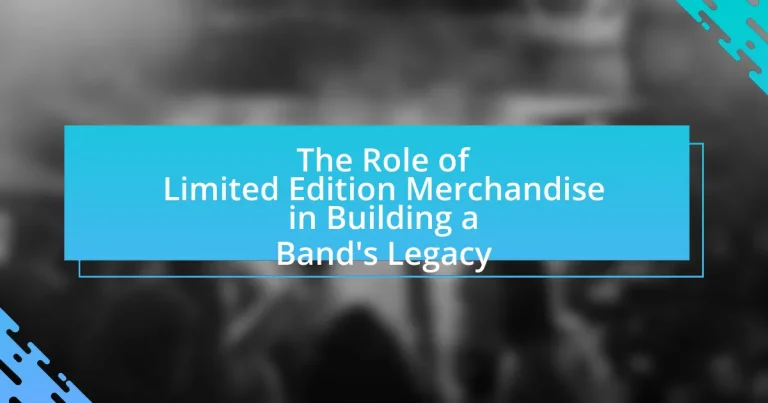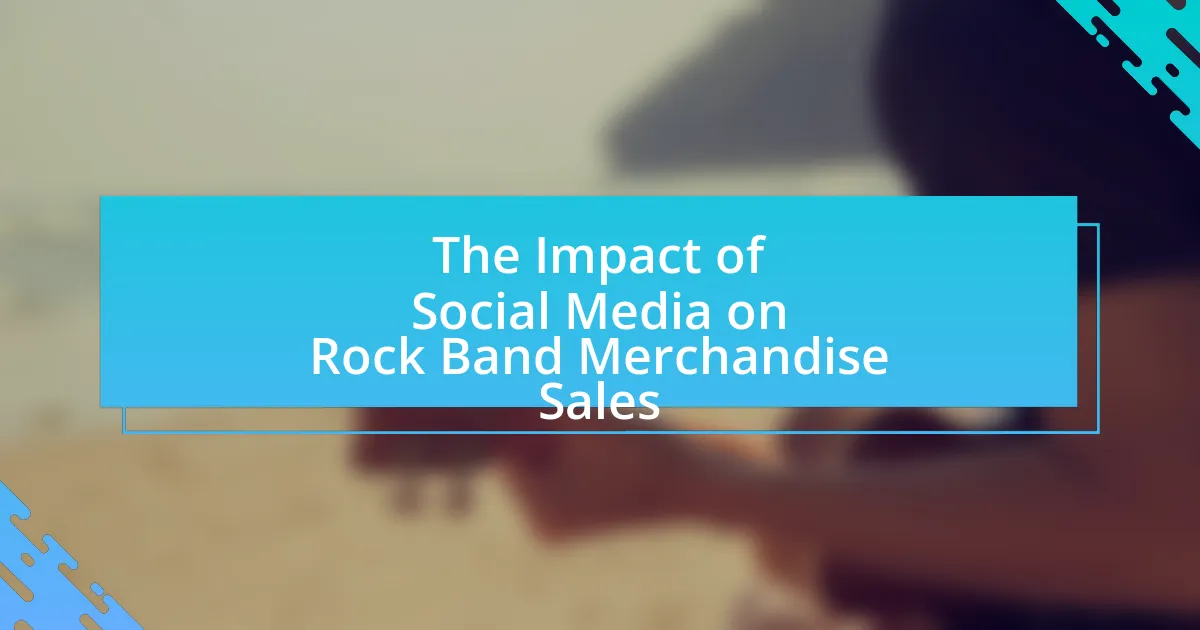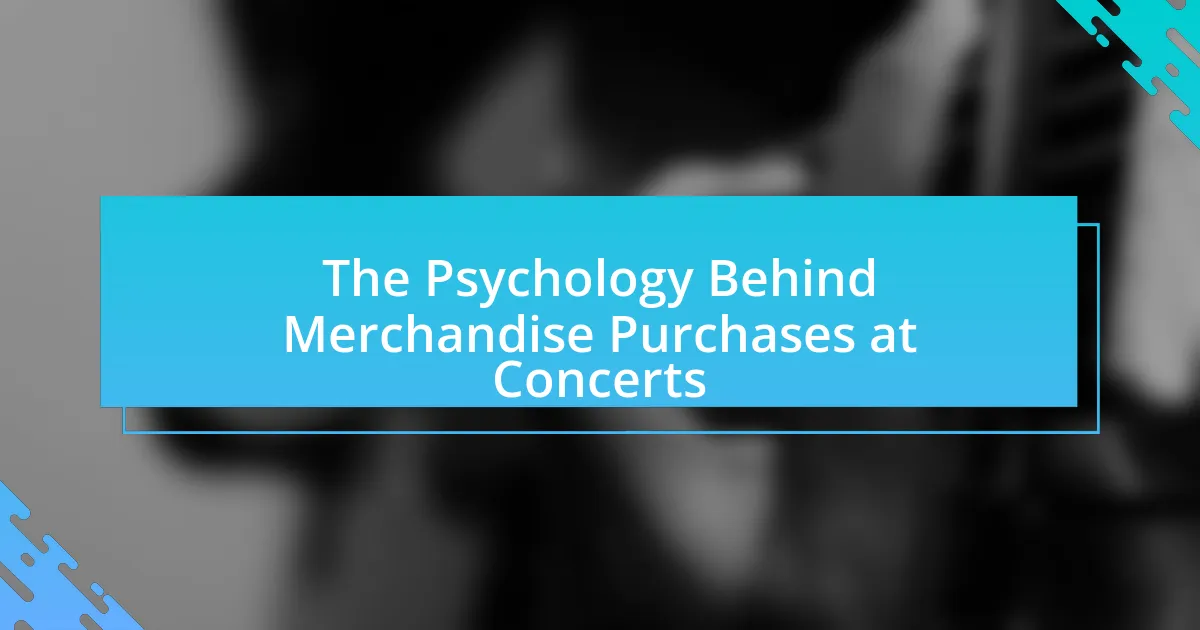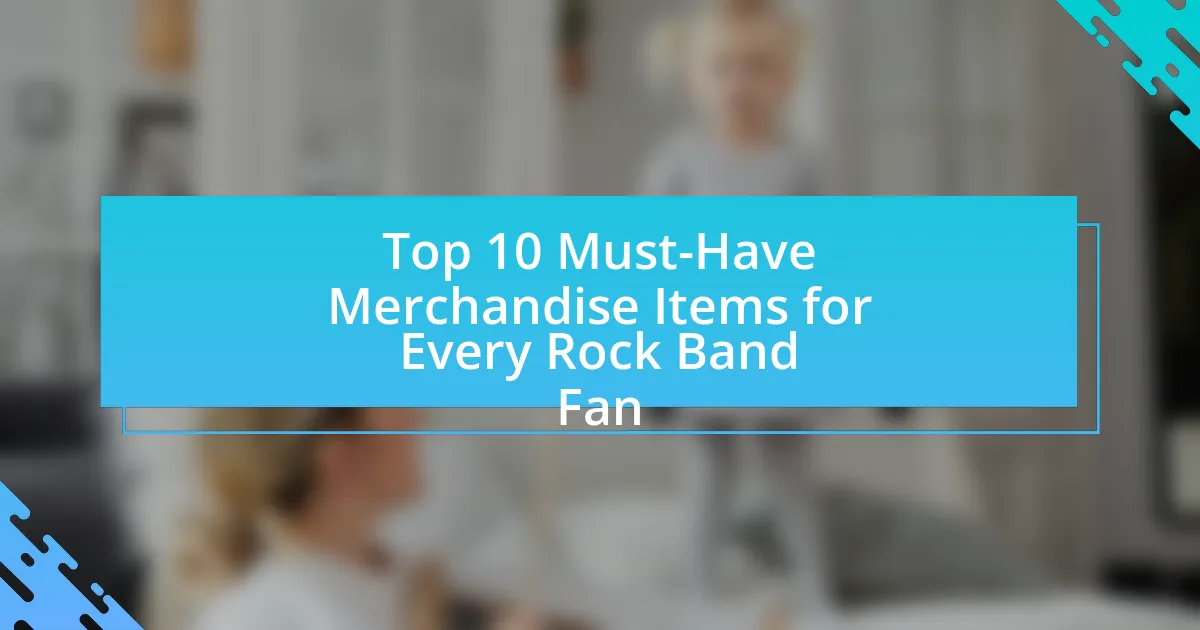Limited edition merchandise is a vital component in establishing and enhancing a band’s legacy, as it fosters exclusivity and deepens fan engagement. This article explores how such merchandise commemorates significant events, contributes to a band’s identity, and creates emotional connections among fans. It examines the types of limited edition items commonly produced, their impact on financial success, and the strategies bands can employ to market these exclusive products effectively. Additionally, the article highlights historical examples that illustrate the long-term influence of limited edition merchandise on a band’s cultural significance and community building among fans.
What is the Role of Limited Edition Merchandise in Building a Band’s Legacy?
Limited edition merchandise plays a crucial role in building a band’s legacy by creating a sense of exclusivity and deepening fan engagement. This type of merchandise often commemorates significant events, such as album releases or anniversaries, which helps to solidify the band’s historical significance in the music industry. For example, when The Beatles released limited edition vinyl records, it not only celebrated their music but also contributed to their lasting impact on popular culture. Additionally, limited edition items can increase a band’s perceived value, as fans are often willing to pay a premium for unique memorabilia, thereby enhancing the band’s financial sustainability and cultural relevance over time.
How does limited edition merchandise contribute to a band’s identity?
Limited edition merchandise significantly contributes to a band’s identity by creating a unique and exclusive connection between the band and its fans. This exclusivity fosters a sense of belonging and loyalty among fans, as they possess items that are not widely available, enhancing their personal connection to the band’s brand. For instance, when a band releases a limited edition vinyl or apparel, it often reflects the band’s artistic vision or a specific moment in their career, reinforcing their narrative and aesthetic. This strategy not only differentiates the band in a crowded market but also solidifies their legacy, as fans often cherish these items as collectibles, further embedding the band’s identity in their personal histories.
What types of limited edition merchandise are commonly produced by bands?
Bands commonly produce limited edition merchandise such as vinyl records, apparel, posters, and collectibles. Vinyl records often feature exclusive artwork or bonus tracks, appealing to audiophiles and collectors. Apparel includes items like t-shirts, hoodies, and hats, often showcasing unique designs or tour dates. Posters are frequently created in limited runs, featuring artwork or photography from specific events or tours. Collectibles can range from signed items to unique memorabilia, enhancing the personal connection fans have with the band. These merchandise types not only generate revenue but also strengthen the band’s legacy by creating tangible connections with their audience.
How does the exclusivity of merchandise enhance a band’s image?
Exclusivity of merchandise enhances a band’s image by creating a perception of rarity and desirability among fans. When a band offers limited edition items, it fosters a sense of belonging and loyalty among its audience, as fans feel they possess something unique that not everyone can acquire. This strategy not only elevates the band’s status but also drives demand, as evidenced by the success of bands like The Beatles and their limited release albums, which have historically commanded higher prices and increased fan engagement. Such exclusivity reinforces the band’s brand identity, making it more memorable and appealing in a competitive music industry.
Why is limited edition merchandise important for fan engagement?
Limited edition merchandise is crucial for fan engagement because it creates a sense of exclusivity and urgency among fans. This exclusivity drives demand, as fans are motivated to purchase items that are not widely available, enhancing their emotional connection to the band. For instance, a study by the Journal of Marketing Research found that scarcity can significantly increase consumer desire, leading to higher sales and stronger brand loyalty. By offering limited edition items, bands can foster a deeper relationship with their audience, encouraging fans to feel like part of an exclusive community.
How does limited edition merchandise create a sense of community among fans?
Limited edition merchandise fosters a sense of community among fans by creating exclusivity and shared experiences. When fans acquire unique items, they feel a connection to one another, as these products often symbolize a collective identity tied to the band or brand. This shared ownership of limited items encourages interaction and bonding among fans, as they discuss their acquisitions and experiences related to the merchandise. For instance, studies have shown that fans who own exclusive items are more likely to engage in social activities, such as attending events or participating in online forums, thereby strengthening their community ties.
What emotional connections do fans develop through owning limited edition items?
Fans develop deep emotional connections through owning limited edition items by feeling a sense of exclusivity and belonging. This ownership often signifies a personal investment in the band or brand, enhancing their identity as part of a select group of supporters. Research indicates that limited edition items can evoke nostalgia and strengthen emotional ties, as fans associate these items with memorable experiences or milestones related to the band. For instance, a study published in the Journal of Consumer Research highlights that scarcity increases perceived value, leading to heightened emotional attachment. Thus, owning limited edition merchandise not only fulfills a desire for uniqueness but also reinforces fans’ loyalty and connection to the band’s legacy.
In what ways does limited edition merchandise impact a band’s financial success?
Limited edition merchandise significantly enhances a band’s financial success by creating scarcity and exclusivity, which drives demand among fans. This demand often results in higher sales prices compared to standard merchandise, as fans are willing to pay a premium for unique items. For example, a study by the University of Southern California found that bands releasing limited edition vinyl records saw an average revenue increase of 30% during the release period compared to regular merchandise sales. Additionally, limited edition items can foster a sense of community among fans, encouraging repeat purchases and brand loyalty, which further contributes to sustained financial growth.
How do sales of limited edition merchandise compare to regular merchandise?
Sales of limited edition merchandise typically outperform regular merchandise due to their perceived exclusivity and scarcity. Research indicates that limited edition items can generate up to 200% more revenue than standard products, as consumers are often willing to pay a premium for unique offerings. This phenomenon is supported by the psychology of scarcity, where the limited availability creates urgency and enhances desirability, leading to increased sales. For example, a study by Gierl and Huettl (2010) published in the Journal of Retailing found that consumers are more likely to purchase limited edition items because they associate them with higher value and status.
What role does pricing play in the perceived value of limited edition items?
Pricing significantly influences the perceived value of limited edition items by creating a sense of exclusivity and scarcity. When prices are set higher for limited edition merchandise, consumers often associate the elevated cost with superior quality and uniqueness, enhancing the item’s desirability. Research indicates that consumers are willing to pay a premium for items perceived as rare or exclusive, as demonstrated in studies showing that limited availability can increase demand and perceived value (Cialdini, 2009). This psychological principle, known as scarcity, suggests that higher pricing reinforces the notion that the item is special and worth acquiring, thereby solidifying its status within the context of a band’s legacy.
How does limited edition merchandise influence a band’s legacy over time?
Limited edition merchandise significantly enhances a band’s legacy over time by creating a sense of exclusivity and deepening fan engagement. This type of merchandise often becomes collectible, leading to increased demand and value, which can elevate the band’s status in music history. For instance, when The Beatles released limited edition albums and memorabilia, these items not only generated substantial revenue but also solidified their cultural impact, making them iconic figures in music. Additionally, the scarcity of such items fosters a community among fans, as ownership of limited edition merchandise often signifies a deeper connection to the band, further embedding the band’s legacy in the collective memory of music enthusiasts.
What historical examples illustrate the long-term impact of limited edition merchandise?
Limited edition merchandise has significantly impacted the long-term legacy of various bands, with notable examples including The Beatles and Nirvana. The Beatles’ “The White Album” was released in a limited edition format, with the first pressing featuring a unique serial number, which has since become a collector’s item, enhancing the band’s historical significance and value in music culture. Similarly, Nirvana’s “MTV Unplugged in New York” album was released as a limited edition vinyl, which not only commemorated a pivotal performance but also solidified the band’s influence in the grunge movement, leading to increased sales and a lasting legacy. These examples illustrate how limited edition merchandise can create a lasting impact on a band’s cultural footprint and financial value.
How can limited edition merchandise be used to commemorate significant events in a band’s career?
Limited edition merchandise can effectively commemorate significant events in a band’s career by creating unique, tangible reminders of those milestones. For instance, when a band releases a special album or celebrates an anniversary, exclusive items such as vinyl records, apparel, or collectibles can serve as physical representations of that moment. These items not only enhance fan engagement but also solidify the band’s legacy by marking important achievements, such as a landmark concert or a major award. Historical examples include the limited edition merchandise released by bands like The Beatles for their 50th anniversary, which not only celebrated their impact on music but also provided fans with a collectible that holds sentimental value.
What strategies can bands employ to effectively market limited edition merchandise?
Bands can effectively market limited edition merchandise by leveraging exclusivity, utilizing social media campaigns, and engaging their fanbase through pre-orders and special events. Exclusivity creates a sense of urgency, encouraging fans to purchase quickly; for example, limited runs of items can sell out within hours, as seen with many successful band merchandise launches. Social media campaigns can amplify reach and engagement, with platforms like Instagram and Twitter allowing bands to showcase merchandise visually and interact with fans directly. Additionally, offering pre-orders or hosting special events, such as pop-up shops or exclusive concerts, can create buzz and drive sales, as evidenced by bands that have successfully integrated these strategies into their marketing efforts.
How can social media be leveraged to promote limited edition items?
Social media can be leveraged to promote limited edition items by creating targeted campaigns that generate urgency and exclusivity. Platforms like Instagram and Facebook allow brands to showcase visually appealing content, such as high-quality images and videos of the limited edition items, which can attract attention and drive engagement. Additionally, utilizing countdown timers and limited-time offers in posts can enhance the sense of urgency, encouraging followers to act quickly.
For instance, a study by Sprout Social found that posts with images receive 650% higher engagement than text-only posts, highlighting the effectiveness of visual content in capturing audience interest. Furthermore, collaborating with influencers who resonate with the target audience can amplify reach and credibility, as their endorsements can lead to increased trust and interest in the limited edition items.
What role do collaborations with artists or brands play in enhancing merchandise appeal?
Collaborations with artists or brands significantly enhance merchandise appeal by leveraging the established fan bases and reputations of both parties. This synergy creates unique products that attract attention and generate excitement, as seen in successful partnerships like Nike and Travis Scott, which resulted in limited edition sneakers that sold out rapidly due to their cultural relevance and exclusivity. Such collaborations not only increase perceived value but also foster a sense of community among fans, driving higher sales and brand loyalty.
What are the best practices for creating limited edition merchandise that resonates with fans?
The best practices for creating limited edition merchandise that resonates with fans include understanding fan preferences, ensuring exclusivity, and incorporating high-quality design. Understanding fan preferences involves conducting surveys or engaging with fans on social media to gather insights about what they value. Ensuring exclusivity can be achieved by limiting the quantity of items produced, which creates a sense of urgency and desirability; for instance, a band might release only 500 signed vinyl records. High-quality design is crucial, as aesthetically pleasing and well-crafted merchandise enhances perceived value and encourages purchases. According to a study by the Journal of Marketing Research, limited edition products can increase consumer interest by 30% when they are perceived as unique and high-quality.

















